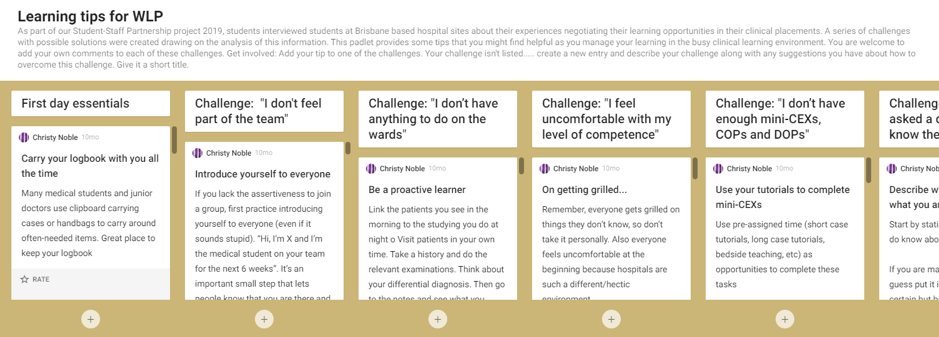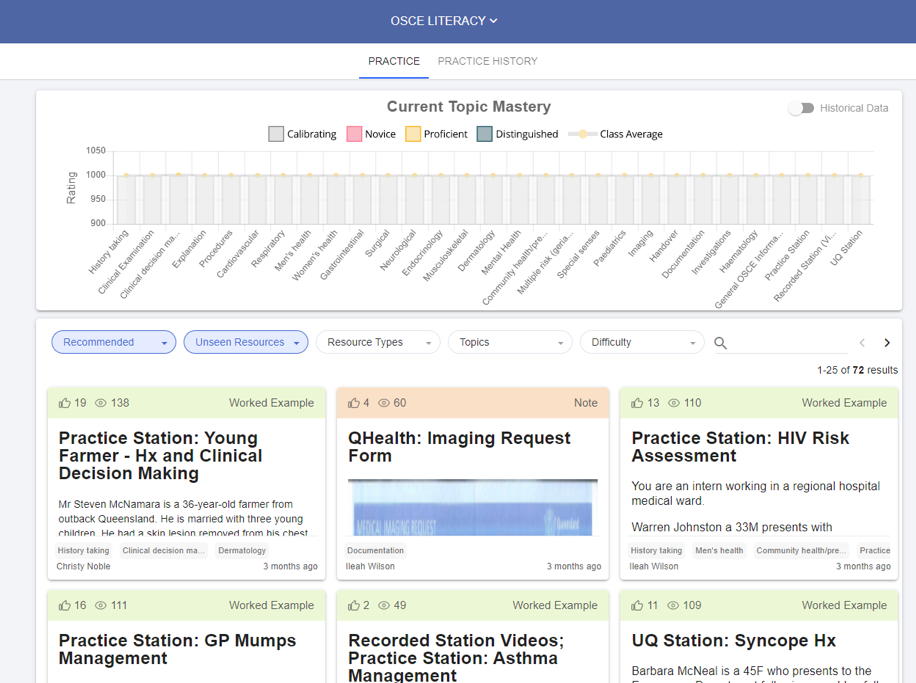Medical education opportunities for MD Program students
As a student studying the Doctor of Medicine program at UQ there are options available for you to further your interest in medical education.
All health professionals need to be committed to lifelong learning and contribute to the learning of others. During the Doctor of Medicine program there are opportunities to enhance your understanding about medical education which is a recognised discipline of work and study just like other medical disciplines.
Curricular opportunities
You can join experienced medical educators via the following formal study options:
Some of the past examples of AME supervised Medical Education projects that students have been involved in are:
- Engagement in a medical education focused research project in the Year 2 selective course: Foundations of Medical Research (MEDI7281).
- Factors associated with transition to learning in the clinical setting,
- Evaluation of student engagement in peer learning using the RiPPLE platform
- Completion of a medical education elective in the Personalised Learning Course (MEDI7413) in year 4. In 2020 year 4 students participated in projects to develop online resources in a range of topics in general medicine and also working on an OSCE assessment literacy program to support students in preparing for this important clinical assessment.
- Consider an additional research experience with an education focus. The Student Research Portal contains all information on research options for medical students
- Work on a project with AME staff.
Extra-curricular opportunities
There are other opportunities that may be available for you to further your interest in medical education. These include:
- Applying for Student-Staff Partnership projects managed centrally by Careers and Employability
- A number of course coordinators in the MD and AME staff have worked closely with student partners on a range of curriculum enhancement initiatives (full listing here).
- Some examples of projects where AME staff have partnered with students completed to date include:
- Co-creation of MEDI7282: Preparation for US Medical Licensing Examination (USMLE) Step 1 Course (2019)
- Enhancing student transition to work integrated learning in medicine (ESTWILM) (2019)

- A feedback literacy program to improve medical student engagement in workplace feedback (2020)
- Co-creating better feedback and assessment in MEDI7316 & MEDI7417 (2020)
- Developing OSCE assessment literacy - towards a cultivated community of practice approach (2020)
- HERMES - Highlighting Experiences of Residents for Medical Education and Safety - an investigation to help foster the development of safe and effective clinicians. (2020) – Developing curriculum resources for developing graduate preparedness to raise concerns about patient safety, colleagues’ performance, and bullying and harassment in the clinical workplace and other matters including:
- Seeking support about patient clinical status and treatment;
- Seeking support for psychological distress;
- Raising concerns about bullying or harassment;
- Raising concerns about patient safety or perceived deficiencies in care;
- Raising concerns about colleagues who are distressed or not performing; and
- Managing relationships with supervisors/seniors.

Work with AME academic staff
AME academic staff are actively engaged in medical education research.
You can review the academic staff, their current projects and research expertise by reviewing the UQ Research staff profiles.
OSCE literacy program – in the 6 week program, MD4 student, interns and junior house officers help facilitate small tutorials and mock OSCEs with year 3 students who are preparing for their OSCE. The program ran for the first time in 2020 and was lead and facilitated by Year 4 students. It received great feedback from the MD3 students:
“Wish it went for longer! It was great. Maybe if it’s kept to 6 weeks, you could help facilitate study groups from participants for afterwards? We get very little OSCE prep in our clinical sites otherwise.”
“Just wanted to say thank you for your hard work. The OSCE Literacy program has helped reduce the stress I had around OSCEs, and it’s also given me my first step into OSCE preparation.”
We are continuing to refine and further develop our OSCE literacy program by building more learning resources and creating new learning opportunities. Please contact us if you’d like to be a tutor or help design learning materials.
Become a student member of a medical education professional organisation
Student memberships are available to all the peak health professions educator associations. Although each association has a primary country base, all promote international collaboration.
- Australia and New Zealand - ANZAHPE: The Australian and New Zealand Association for Health Professions Educators
- North America - IAMSE: International Association for Medical Science Educators
- Asia-Pacific Region – APBSEA: Asia-Pacific Biomedical Science Educators Association
- UK & International – ASME: The Association for the Study of Medical Education
- UK & International – JASME: The Junior Association for the Study of Medical Education: Specifically for medical students and health professions students.
- Europe & International – AMEE: Association for Medical Education in Europe
